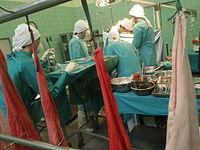
Photo from wikipedia
Purpose of review To summarize new discoveries in viral pathogenesis and novel therapeutic and prophylactic strategies in organ transplant recipients. Recent findings For decades, prophylaxis of cytomegalovirus (CMV) has been… Click to show full abstract
Purpose of review To summarize new discoveries in viral pathogenesis and novel therapeutic and prophylactic strategies in organ transplant recipients. Recent findings For decades, prophylaxis of cytomegalovirus (CMV) has been the standard preventive strategy, but new clinical trials are expected to determine the advantages of preemptive therapy over prophylaxis. Novel anti-CMV agents, such as maribavir and letermovir, are being studied for the treatment of resistant/refractory CMV as alternatives to foscarnet and cidofovir. CMV immune monitoring may offer individualized management plans. Epstein–Barr virus infections in transplant recipients are difficult to prevent and treat, though recent data suggest possible merit to pretransplant rituximab among high-risk transplant recipients. We review the groundbreaking HIV-to-HIV organ transplant trials, which are expected to revolutionize the care of HIV-infected individuals. Finally, we review topical developments in human herpesvirus 8, Zika virus, RNA respiratory viruses, adenovirus, norovirus, and polyoma viruses in organ transplantation. Summary Ongoing trials to optimize CMV prophylaxis and treatment, and outcomes of HIV-to-HIV organ transplantation in the United States, have significant implications to optimize management of these viruses in transplant recipients. Assessment of new antivirals and antiviral strategies, such as adoptive immunotherapy, is warranted for refractory viral infections.
Journal Title: Current Opinion in Infectious Diseases
Year Published: 2017
Link to full text (if available)
Share on Social Media: Sign Up to like & get
recommendations!